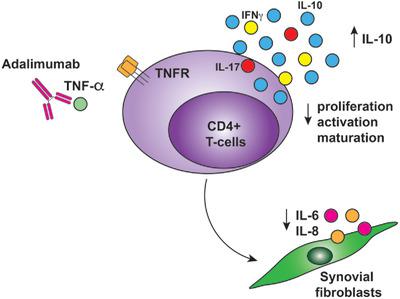当前位置:
X-MOL 学术
›
Eur. J. Immunol.
›
论文详情
Our official English website, www.x-mol.net, welcomes your
feedback! (Note: you will need to create a separate account there.)
Anti-TNF treatment negatively regulates human CD4+ T-cell activation and maturation in vitro, but does not confer an anergic or suppressive phenotype.
European Journal of Immunology ( IF 4.5 ) Pub Date : 2019-12-03 , DOI: 10.1002/eji.201948190 Giovanni A M Povoleri 1 , Sylvine Lalnunhlimi 1 , Kathryn J A Steel 1 , Shweta Agrawal 1 , Aoife M O'Byrne 1 , Michael Ridley 1 , Shahram Kordasti 2 , Klaus S Frederiksen 3 , Ceri A Roberts 1 , Leonie S Taams 1
European Journal of Immunology ( IF 4.5 ) Pub Date : 2019-12-03 , DOI: 10.1002/eji.201948190 Giovanni A M Povoleri 1 , Sylvine Lalnunhlimi 1 , Kathryn J A Steel 1 , Shweta Agrawal 1 , Aoife M O'Byrne 1 , Michael Ridley 1 , Shahram Kordasti 2 , Klaus S Frederiksen 3 , Ceri A Roberts 1 , Leonie S Taams 1
Affiliation

|
TNF-blockade has shown clear therapeutic value in rheumatoid arthritis and other immune-mediated inflammatory diseases, however its mechanism of action is not fully elucidated. We investigated the effects of TNF-blockade on CD4+ T cell activation, maturation, and proliferation, and assessed whether TNF-inhibitors confer regulatory potential to CD4+ T cells. CyTOF and flow cytometry analysis revealed that in vitro treatment of human CD4+ T cells with the anti-TNF monoclonal antibody adalimumab promoted IL-10 expression in CD4+ T cells, whilst decreasing cellular activation. In line with this, analysis of gene expression profiling datasets of anti-TNF-treated IL-17 or IFN-γ-producing CD4+ T cells revealed changes in multiple pathways associated with cell cycle and proliferation. Kinetics experiments showed that anti-TNF treatment led to delayed, rather than impaired T-cell activation and maturation. Whilst anti-TNF-treated CD4+ T cells displayed some hyporesponsiveness upon restimulation, they did not acquire enhanced capacity to suppress T-cell responses or modulate monocyte phenotype. These cells however displayed a reduced ability to induce IL-6 and IL-8 production by synovial fibroblasts. Together, these data indicate that anti-TNF treatment delays human CD4+ T-cell activation, maturation, and proliferation, and this reduced activation state may impair their ability to activate stromal cells.
中文翻译:

抗TNF治疗会在体外负面调节人CD4 + T细胞的活化和成熟,但不会产生无反应或抑制性表型。
TNF阻断剂在类风湿性关节炎和其他免疫介导的炎症性疾病中已显示出明确的治疗价值,但其作用机理尚未完全阐明。我们研究了TNF阻断对CD4 + T细胞活化,成熟和增殖的影响,并评估了TNF抑制剂是否赋予CD4 + T细胞调节潜能。CyTOF和流式细胞仪分析表明,用抗TNF单克隆抗体阿达木单抗体外治疗人CD4 + T细胞可促进CD4 + T细胞中IL-10的表达,同时减少细胞活化。与此相符,对抗TNF处理的IL-17或产生IFN-γ的CD4 + T细胞的基因表达谱数据集的分析揭示了与细胞周期和增殖相关的多种途径的变化。动力学实验表明,抗TNF治疗可导致延迟,而不是损害T细胞的活化和成熟。尽管抗TNF处理的CD4 + T细胞在重新刺激后表现出一些低反应性,但它们没有获得增强的抑制T细胞反应或调节单核细胞表型的能力。然而,这些细胞显示出滑膜成纤维细胞诱导IL-6和IL-8产生的能力降低。总之,这些数据表明抗TNF治疗会延迟人CD4 + T细胞的活化,成熟和增殖,而这种降低的活化状态可能会削弱其活化基质细胞的能力。然而,这些细胞显示出滑膜成纤维细胞诱导IL-6和IL-8产生的能力降低。总之,这些数据表明抗TNF治疗会延迟人CD4 + T细胞的活化,成熟和增殖,而这种降低的活化状态可能会削弱其活化基质细胞的能力。然而,这些细胞显示出滑膜成纤维细胞诱导IL-6和IL-8产生的能力降低。总之,这些数据表明抗TNF治疗会延迟人CD4 + T细胞的活化,成熟和增殖,而这种降低的活化状态可能会削弱其活化基质细胞的能力。
更新日期:2019-12-03
中文翻译:

抗TNF治疗会在体外负面调节人CD4 + T细胞的活化和成熟,但不会产生无反应或抑制性表型。
TNF阻断剂在类风湿性关节炎和其他免疫介导的炎症性疾病中已显示出明确的治疗价值,但其作用机理尚未完全阐明。我们研究了TNF阻断对CD4 + T细胞活化,成熟和增殖的影响,并评估了TNF抑制剂是否赋予CD4 + T细胞调节潜能。CyTOF和流式细胞仪分析表明,用抗TNF单克隆抗体阿达木单抗体外治疗人CD4 + T细胞可促进CD4 + T细胞中IL-10的表达,同时减少细胞活化。与此相符,对抗TNF处理的IL-17或产生IFN-γ的CD4 + T细胞的基因表达谱数据集的分析揭示了与细胞周期和增殖相关的多种途径的变化。动力学实验表明,抗TNF治疗可导致延迟,而不是损害T细胞的活化和成熟。尽管抗TNF处理的CD4 + T细胞在重新刺激后表现出一些低反应性,但它们没有获得增强的抑制T细胞反应或调节单核细胞表型的能力。然而,这些细胞显示出滑膜成纤维细胞诱导IL-6和IL-8产生的能力降低。总之,这些数据表明抗TNF治疗会延迟人CD4 + T细胞的活化,成熟和增殖,而这种降低的活化状态可能会削弱其活化基质细胞的能力。然而,这些细胞显示出滑膜成纤维细胞诱导IL-6和IL-8产生的能力降低。总之,这些数据表明抗TNF治疗会延迟人CD4 + T细胞的活化,成熟和增殖,而这种降低的活化状态可能会削弱其活化基质细胞的能力。然而,这些细胞显示出滑膜成纤维细胞诱导IL-6和IL-8产生的能力降低。总之,这些数据表明抗TNF治疗会延迟人CD4 + T细胞的活化,成熟和增殖,而这种降低的活化状态可能会削弱其活化基质细胞的能力。











































 京公网安备 11010802027423号
京公网安备 11010802027423号